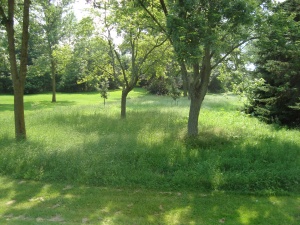Turf
Best practices for mown turf
Close mowing removes leaves and increases shoot production, leading to a denser 'velvety' appearance. But the damage also reduces the plant's photosynthetic processes and stunts its growth. Notably, when grass is stressed by close pruning, it doesn't have the resources to develop deeper roots. The shallow roots in turf grass make it particularly susceptible to drought conditions and significantly weakens the resiliency of the grass. Any pruning (including mowing) introduces cut edges on the leaf blades, increasing the potential for disease. Turf grass mixtures in Ontario often containa high proportion of Kentucky Bluegrass [1]. For optimal long term health and resiliency, this turf should be cut no shorter than 7 cm. [2] Permitting the grass to grow longer also increases the roughness of swales or vegetated filter strips which are turfed.
| n value range | Good condition turf grass | Other |
|---|---|---|
| 0.002 - 0.010 | Where the average depth of flow is at ≥ 2 times the height of the vegetation | Supple tree seedlings such as willow or cottonwood growing where the average depth of flow is at ≥ 3 times the height of the vegetation |
| 0.010 - 0.025 | Where the average depth of flow is between 1 - 2 times the height of the vegetation | Moderately dense weeds, or tree seedlings growing where the average depth of flow is from 2 -3 times the height of the vegetation |
| 0.025 - 0.050 | Where the average depth of flow is about equal to the height of the vegetation | 8- to 10-year-old willow or cottonwood trees inter-grown with some weeds and brush (none of the vegetation in foliage) |
| 0.050 - 0.100 | Where the average depth of flow is < 0.5 times height of the vegetation | bushy willow trees about 1 year old inter-grown with weeds along side slopes (all vegetation in full foliage) |
References
- ↑ OMAFRA Lawn Establishment July 2008 http://www.omafra.gov.on.ca/english/crops/facts/08-025w.htm#turf Accessed Dec 19, 2017
- ↑ Karen Panter, Turf and Water, Sept 12, 2013 https://www.slideshare.net/kpanter/turf-and-water Accessed Dec 19, 2017
- ↑ Arcement, G.J., Schneider, R. Guide for Selecting Manning's Roughness Coefficients for Natural Channels and Flood Plains U.S.G.S. WATER-SUPPLY PAPER 2339, 1989 https://pubs.usgs.gov/wsp/2339/report.pdf
